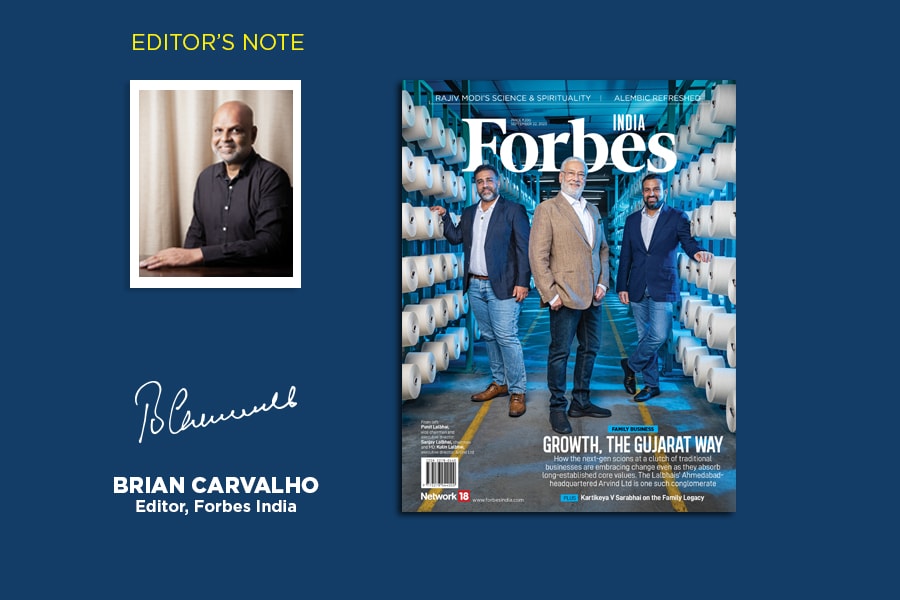Decoding Ahmedabad's next-gen family businesses
This fortnight's issue is the first in a series of family businesses from pockets of enterprise that have been built over decades, even centuries. We start with Gujarat, where Ahmedabad has emerged ov



If only a fraction of family businesses does indeed survive till the third generation—as a few studies have claimed in the past—the Indian ones may well be bucking the trend. Over the past three to four decades, the Burmans, Godrejs, Birlas, Tatas and, more recently, the Ambanis, to name just a handful of large conglomerates, have demonstrated that legacy values and culture can indeed walk hand-in-hand with change and new opportunities.
Sure, there are examples of legacy businesses either struggling to adapt or running out of able successors, but if family businesses are estimated to contribute between 60 and 70 percent to annual GDP, it’s primarily because many of them have thrived beyond the third generation.
There are a bunch of traditional family businesses that have consolidated in the regions they took shape in. Today in the digital age of interconnectivity, being in the big cities matters less, and you could be running a business out of Vadodara in Gujarat or Kala Amb in Himachal that’s complemented by a sizeable international operation.
Then, there are brands that have become regional warriors—think Aava Water of Ahmedabad or Suguna Foods of Coimbatore—and are now creating a national footprint.
This fortnight’s issue is the first in a series of family businesses from pockets of enterprise that have been built over decades, even centuries. We start with Gujarat, where Ahmedabad has emerged over time as a city of entrepreneurs, and scions from subsequent generations have picked up the baton.
On the cover are the fourth and fifth generations of the Lalbhai family of Arvind, a textiles conglomerate whose origins can be traced to the late 1800s, when Lalbhai Dalpatbhai set up a textiles mill. Arvind Mills was founded in the 1930s, coinciding with Mahatma Gandhi’s call for Swadeshi.
Today, Arvind Ltd has emerged as a fabrics, apparel and brands powerhouse. Sanjay Lalbhai began the transformation in the early 1980s, when he brought denim to India. Today, as Naandika Tripathi writes, sons Punit and Kulin are taking the legacy forward with a judicious blend of tradition and modernity. A perfect example of this is a fabric that marries the embodiment of Swadeshi, khadi, with denim. For more on the transformation and challenges ahead, ‘A New Fabric’ is a must read.
A little over 100 km from Ahmedabad, towards Mumbai, lies another soaked-in-tradition industrial hub, Vadodara. The quest for that fine balance between legacy and change is underway at the 116-year-old Alembic Group, where the fourth generation goes about building a glocal presence, rebuilding the pharma portfolio, and refreshing it with products that are more relevant today. Pranav and Shaunak, two of three sons of chairman Chirayu Amin, have the mandate to grow the international and domestic businesses, respectively. The patriarch tells Naini Thaker: “The succession is working well." For more on how the sons are transforming a business that pre-Independence was focussed on making as much locally—from pharma machinery to glass bottles—don’t miss ‘Shaking things up’.
Back in Ahmedabad, Rajiv Modi, son of the ‘Medicine Man of India’ Indravadan Ambalal Modi, who co-founded Cadila Pharma in the early 1950s, is obsessed with spirituality and science. And it’s for this reason that he has chosen to keep the company privately-held. Although he does concede that it now needs to be much bigger in revenue than it currently is, and gain market share. For more on that delicate tussle between personal priorities and company growth, Tripathi’s profile of the reclusive Modi makes for a fascinating read.
Best,
Brian Carvalho
Editor, Forbes India
Email: Brian.Carvalho@nw18.com
Twitter ID: @Brianc_Ed
First Published: Sep 11, 2023, 12:16
Subscribe Now